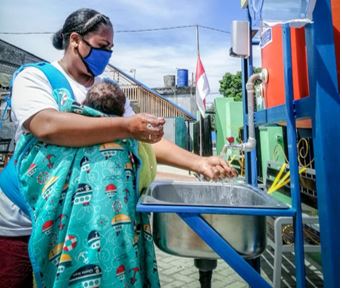
Caption: A woman washes her hands in a handwashing point at Sentani Health Center, Papua. Functional Water, Sanitation, and Hygiene (WASH) services in health care facilities are critical for patient safety and quality of care. Photo credit: Sentani Health Center
Available and functional water, sanitation and hygiene (WASH) services in health care facilities are fundamental for patient safety and quality of care. Inadequate WASH services place health workers and patients at significant risk of infection and increased risk of mortality. Equal access to WASH for women and vulnerable groups needs to be ensured as an integral part of upholding human rights. Moreover, consistent application of WASH and waste management practices is essential to prevent the transmission of COVID-19, especially in health care settings.
The importance of WASH in health care facilities is enshrined in the 2030 Agenda for Sustainable Development. Sustainable Development Goal (SDG) 6 – Clean Water and Sanitation – clearly mandates the availability and sustainable management of water and sanitation for all. In addition, WASH is essential to achieve SDG 3 – Good health and well-being – particularly the provision of quality essential health care services. Despite global progress, one in four health care facilities worldwide lack basic water services. Responding to the urgency to improve WASH, 194 Member States unanimously passed a resolution at the World Health Assembly in 2019, committing to develop national roadmaps, monitor progress and invest in WASH in health care facilities.

Fig. 1. One in four health care facilities lack basic water services
Indonesia is committed to improving WASH in health care facilities and has made substantial progress over the last decade. In 2011, according to the Health Facility Survey (Risfaskes) report, 38% community health centers (Puskesmas) surveyed did not have basic water services. In the most recent survey from 2019, this percentage was reduced to 15%. Despite this progress, almost 3% of Puskesmas surveyed do not practice waste segregation, which can increase the risk of infection for health care workers, patients and waste handlers.
To support Indonesia in achieving the SDGs, WHO is working with the Ministry of Health (MoH) to implement Water and Sanitation for Health Facility Improvement Tool (WASH FIT). WASH FIT is a risk-based management approach to improve quality of care through the assessment of seven domains in health care facilities, namely water, sanitation, hand hygiene, waste management, environmental cleaning and disinfection, energy and power, and management. WASH FIT enables health care facility managers to prioritize risks identified in these domains and define and implement actions for improvement.

Caption: WHO presented the methodology to adopt WASH FIT in health care facilities. Credit: WHO
On 9, 17, 19, 24, and 26 November 2020, WHO, in collaboration with MoH, trained participants from across Indonesia on the application of WASH FIT and how to form efficient WASH teams in health care facilities to identify needs, gaps and to create improvement plans. In addition, WHO explained ways to enhance climate resilience in health care facilities to mitigate for climate change-related disasters that may impact service delivery, such as water scarcity and flooding. WHO also asked to ensure that WASH in health care facilities is gender-responsive and accessible to vulnerable groups. Guided by the facilitators, participants had the opportunity to conduct a virtual WASH FIT assessment of and draft improvement plans for a puskesmas.

Caption: WHO presented approaches to integrate gender and social inclusion in WASH infrastructure in health care facilities. Credit: WHO
Throughout the Training of Trainers (ToT), WHO used various methods to stimulate interactive and lively discussions. Presenters facilitated small group discussions in break out rooms. As advocacy work is an important part of WASH FIT, presenters and participants conducted several role-plays to demonstrate how to advocate for WASH improvement to health facility managers and government. Using these methods, participants learned not only about WASH FIT, but how to identify opportunities and respond to common challenges to improve WASH in health care facilities. Participants brought insights from their provinces, for example, the importance of involving local government in the WASH FIT assessment, cultural aspects on the use of WASH facilities, and the challenges of smaller facilities with very few staff.
Around 30 participants attended the training, including MoH, Provincial Health Offices, the United Nations Children’s Fund (UNICEF), the United Nations Development Programme (UNDP), and professional associations and NGOs that work with WASH in different provinces in Indonesia, including Médecins Sans Frontières/Doctors Without Borders (MSF), SNV Netherlands Development Organization, Plan International Indonesia, Yayasan Noken Papua, Indonesian Association of Environmental Health Experts (HAKLI), Indonesian Society of Public Health Scholars (PERSAKMI), and Indonesian Public Health Association (IAKMI).
By the end of the training, several participants had drawn up plans to roll out WASH FIT training programmes for Puskesmas in South Sulawesi, Papua, East Nusa Tenggara, West Nusa Tenggara, DKI Jakarta, Banten, North Sumatra, and Maluku. The MoH is further committed to develop a national road map of WASH in Health Care Facilities in 2021.
Creating an enabling environment requires a multisectoral approach with partnerships that work in synergy to improve WASH services. Through this collaboration with government, development partners and NGOs, the ToT has paved the way to improve WASH in health care facilities for all.
